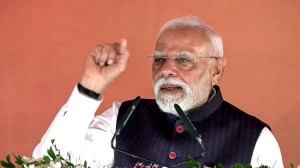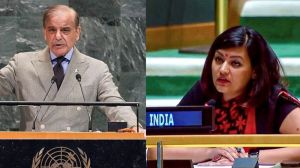Musharraf’s problems with hawks at home make India wary on Kashmir
NEW DELHI, DEC 29: The prospects for an early resumption of the Indo-Pak dialogue have suffered a temporary setback following what New Del...

NEW DELHI, DEC 29: The prospects for an early resumption of the Indo-Pak dialogue have suffered a temporary setback following what New Delhi sees as a recent spurt in terrorist violence and the “anti-India” stir in Nepal which is perceived to be the handiwork of the ISI.
The slowdown began with the shootout at Red Fort for which the Pakistan-based Lashkar-e-Taiba has claimed responsiblity. More than the incident itself, General Musharraf’s reaction seems to have queered the pitch. He described the attack as an “internal affair of India” even after the Lashkar’s office in Islamabad owned up to the incident and warned that more would follow, including one at the Prime Minister’s Office.
Musharraf’s reluctance to criticise the shootout has raised doubts here about Pakistan’s sincerity to resume talks. His statement is being interpreted as a sign that he is not yet ready to sit across the negotiating table contrary to expectations generated after the Vajpayee Government declared a unilateral ceasefire in Jammu and Kashmir.
Highly placed sources in the Government attribute the perceptible change in Pakistan’s attitude to Musharraf’s own anxiety to contain the domestic fallout of his decision to save deposed Prime Minister Nawaz Sharif by exiling him to Saudi Arabia. They feel that Musharraf probably does not want to open another front with the hawks by pushing for talks with India until the dust over Sharif has settled down.
Both Vajpayee and Musharraf have to tread carefully with the hawks in their respective countries. While the disturbing signals from across the border have made officials here wary, the Government is still willing to give the Pakistan CEO the benefit of the doubt in the hope that patience will pay off ultimately.
Official sources maintained that the recent attacks in the Capital and Srinagar would not deter the Centre from purusing its peace initiative and they remained hopeful that the present setback was only a hiccup. However, they did admit that if more attacks follow in view of the Lashkar’s threats, the road to peace may be irrepairably blocked.
The recent developments are a dampener. The Government’s assessment of the ground situation in J & K since September had built hopes that violence levels were coming down. This was seen as an indication of Pakistan’s acceptance of Indian terms for resuming talks.
The confidence that Pakistan was playing ball prompted the Prime Minister to extend an olive branch offering to meet Islamabad halfway to the dialogue table. He told Parliament while announcing the extension of the truce on December 20 that the Government “will initiate such exploratory steps as considered necessary by it so that the composite dialogue process between India and Pakistan could be resumed”.
The statement marked a subtle but significant shift from the earlier emphatic insistence on linking dialogue to the cessation of cross-border terrorism. In fact, both the PM and Home Minister L K Advani have hinted recently that the Government is ready to be flexible on the terrorism issue provided Islamabad responded with a show of sincerity.





- 01
- 02
- 03
- 04
- 05


























